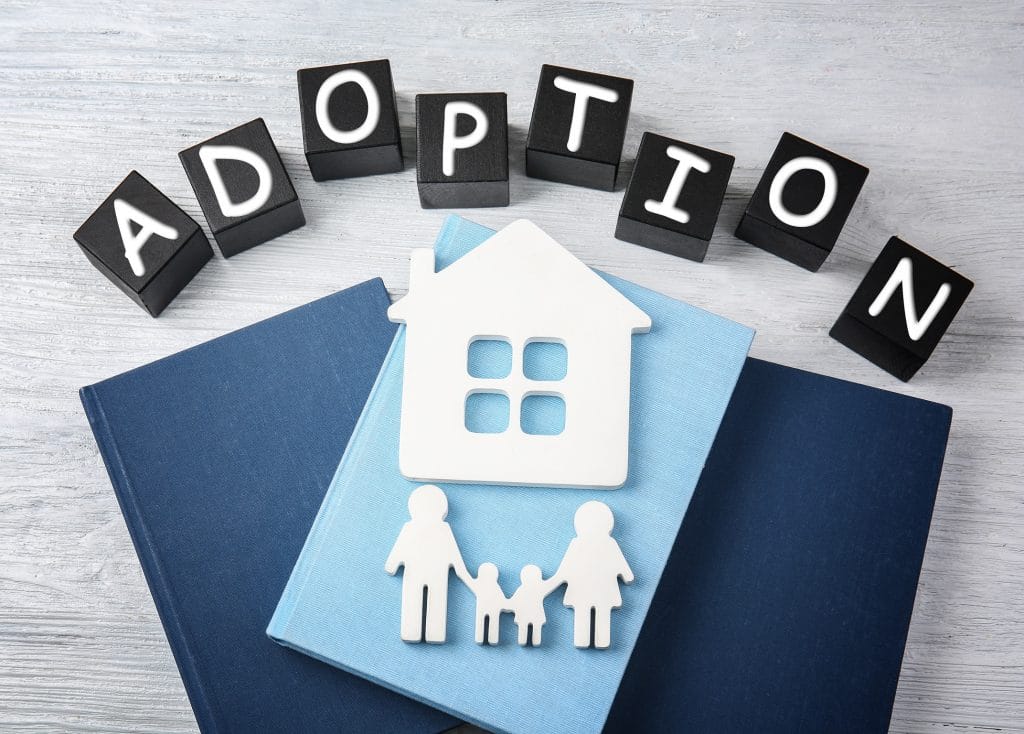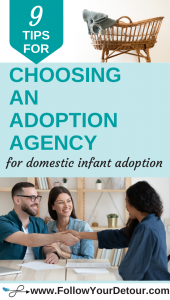
It might sound silly, but choosing an adoption agency was one of the hardest steps in the adoption process for us. Mainly because we had no clue going into the process that our options were practically limitless.
When we first starting exploring adoption, we literally did a Google search for adoption agencies in our city. We thought it was that simple. And for some, it could be. But we quickly learned that our nearest agency wasn’t going to work for us.
We later decided, when realizing how many different routes we could take with our adoption, that we wanted the help of a consultant. Since it was our first adoption and we had little to no exposure to the process, we knew we needed some guidance in navigating the process.
And let me tell you, we learned a lot from our consultant. Here are the things she helped us to consider when choosing the best agencies (yes, that’s plural…you can actually work with more than one at a time) to work with.
I also want to note that you don’t have to work with an agency at all! You can also choose to work with an adoption attorney. You’d typically choose this route if you found a way to self-match with a birth mother. But some attorneys and law centers also have ways of helping adoptive families match with an expectant mother, even though they aren’t licensed agencies.
However, some states do not allow for adoptions to be through attorneys and require that an agency be involved. We know, because Colorado, where we live, is one of those states. So be sure to check on your state’s adoption laws. Furthermore, the purpose of this post is really to help those who plan to go through a traditional adoption agency to match and be placed with their baby.
But First: Local vs. National?
As I mentioned, we started our process with a quick Google search of the nearest adoption agency to our home. Our search turned up with a few local agencies, meaning these agencies only serve families within their geographic area.
After meeting with a social worker from that agency, we were informed that the smaller, local agencies tend to have longer waits. This particular agency said that typically, their families wait 1-3 years for a baby. Makes sense, right? If an agency is only serving birth families and adoptive families in one city, there’s much less “action”. However, local agencies tend to have lower costs for adoptive families. Also, you won’t have to travel for your adoption, which saves money as well. Another advantage of a local agency is the personal touch they can offer by being able to meet you in person rather than over the phone.

We were encouraged by that social worker to call around to other agencies before committing to any one. So we did, and we found ourselves on an informational call with one of the largest agencies in the country. This is when we learned about national agencies that serve birth and adoptive families from all over the country. So we got a sense of both ends of the spectrum.
We got super excited when we heard about their shorter wait times. Their average wait time was 6-9 months! But those wait times come at a much higher cost, nearly double in fact. These agencies need to advertise more extensively in order to attract and serve considerably more expectant women and adoptive families. Therefore, they require more staff as well, and fees for adoptive families are quite high.
As you can see, the disadvantages of working with a nationwide agency, are pretty much the opposite of the advantages of a local agency: higher costs along with travel expenses, interaction with agency will occur via phone and email.
What’s Your (Hopeful) Timeline?
I think the factor to consider when deciding if you’d like to work with a local or a national agency is your timeline. Of course, no one can guarantee that you will adopt in a certain amount of time, so this is just your optimistic timeline.
Many things will influence your timeline. Maybe you’re in no hurry. You have a child or children already and are wanting to expand your family but in no rush to do so. Perhaps you have a year long savings plan you have to achieve first in order to afford the adoption without going into debt.
Or you could be like us. We had already waited over six years to become first time parents, were coming off grieving a painful season of infertility, and anxious to get our baby without breaking the bank even more than we already had on fertility treatments.

It wasn’t until we started working with our consultant that we discovered we could find that happy medium. You can actually find agencies all over the country that aren’t too small, and aren’t too big…but juuuuust right!
First of all, we never would’ve thought that we could work with an agency that wasn’t in our state. Another “trick” we learned is to work with more than one agency at a time. This gives you the opportunity to match quicker, since you’re on more than just one list, but still control your budget. Many agencies have very low fees to apply. We found that we could work with two out-of-state agencies for a third of the cost of that original local agency we first connected with.
We feel like it’s, in a way, getting the best of both worlds. But then again, when you can work with multiple agencies, that just means MORE decisions, right? More research, more applications, more phone calls and emails…I get it. But hopefully we’ll help you at least narrow down the selections with the tips we provide below.
We had the help of our consultant, and you might need that guidance as well. Ours has a network of 20+ agencies that they trust and work closely with. Based on our needs, our consultant provided us with a list of about seven agencies that she felt would be a good fit for us. From that list, we choose two but some couples choose to work with even three or four agencies at once.
9 Tips for Choosing the Right Agency For YOU
After you’ve determined if you’d like to work with a local or national agency, here are some tips for basing your search criteria.
1. Ethical Practices
This one is huge! When it comes to adoption, you definitely don’t want to work with any agency who isn’t using best practices, let alone aren’t aware of and following the adoption laws of each state. It’s unfortunate, but there are scammers that prey on vulnerable adoptive families and loopholes that may make the adoption route easier, but are illegal. You, first and foremost, have to know how to protect yourself.
You want to ensure that an agency is respecting the rights of all parties – you, the birth family, and the child. No information should be kept a secret from either party, the birth mother should never feel coerced, and you should be informed and educated throughout the entire process as well.
The following tips will also help you understand whether or not an agency is using best practices. You’ll also want to do your own research on ethical adoption. But, feel free to come right out and specifically ask an agency directly about their ethics. If they refuse to speak about it with you, sound nervous, or can’t answer questions appropriately, you’ll know to move on to another professional.
2. Expectant Mother Care

How they treat their expectant mothers is one of the best ways to determine if an agency is ethical. These women should be an agency’s priority. They should offer her counseling immediately, throughout the remainder of her pregnancy, and especially after birth. They should provide her with a variety of resources, such as helping her to get her essential needs met (housing, medical insurance, food), ensuring she is able to get prenatal care, and assisting her with anything else pregnancy related.
3. Show Me the Money
Nobody likes to bring up money right away but it’s super important that you fully understand an agency’s fees and costs. You don’t want to sign any contract to sign up with an agency without a clear and upfront explanation of what to expect in terms of payment.
You may not receive a detailed, line-by-line cost breakdown right away, as each adoption situation can vary, but you need a general idea or estimate. You want to make sure that before you get your heart set on an agency that it fits in your budget or that you have a plan for how you’ll afford the adoption. It would be absolutely heartbreaking to be presented with an adoption situation, only to find out you can’t afford it. So be prepared and informed well in advance.
The bottom line is that you want to understand where your money will go. Ask for a breakdown of how your money will be used, and specifically how it will be transferred to the expectant woman you match with when the time comes. There are laws regarding the transactions of this money, so it must be monitored. You’ll want an agency that is straightforward about their costs and that you won’t be surprised by any additional fees down the road.
4. History and Reviews
It’s good to know how long an agency has been in business. Obviously, the longer, the better. You want to find an agency with a long standing history of success. Not that newer agencies can’t be good too, it’s just more peace of mind.
It will also be easier to find reviews on agencies that have been around awhile and reviews can be one of the best ways to get a feel for an agency. Of course, not all reviews can be trusted and there are always two sides to every story, but they can give you a good overall idea of other families experiences with the agency. Check reviews on Google, on the agency’s Facebook page, and ask around to other adoptive families you know or can connect with in Facebook groups. Often times reviews can really help you weed out the bad ones.
5. Nonprofit vs. For-Profit Agencies
A nonprofit adoption agency and a for-profit adoption agency will have differences in their mission, ownership, where their support goes, and who they benefit. The quickest way to tell if an agency is a nonprofit is by looking at their website or emailing them to see if they are a designated 501(c)(3) organization. These organizations rely on donations, grants, and their mission is to benefit society. This means it’s owned by the public and not a person or corporation.
A for-profit agency will be the exact opposite and will be ran as a business, in which the owners use the profits however they please. However, whether an agency is a nonprofit or for-profit really doesn’t impact how they operate and their adoption processes. It may just impact your overall impression of the agency, if you have a certain preference.
Some states have requirements around working with nonprofit agencies, so be sure to understand your state’s laws and regulations. Another thing to consider, is if you plan to apply for grants to help fund your adoption. If so, many grants require that you are working with a nonprofit. They typically disperse the grant money directly to your agency on your behalf, so working with a for-profit agency may disqualify you from receiving certain grants.
6. Make the Call
Once you’ve narrowed your choices of agencies down, you definitely want to call them or schedule a phone appointment with them. This will help you get a much better feel for whether or not an agency will be a good fit for you.
You might find that it’s nearly impossible to get someone on the phone with you, which obviously isn’t a good sign. Or you might find the opposite and be embraced immediately by the agency staff, have plenty of opportunities to ask questions, and be provided additional information and resources after the call. Either way, you’ll get a feeling for what it might be like to work with the agency.
When you have the agency on the phone, you’ll want to be prepared with the questions you need to ask. The following tips contain what you should know before hanging up the phone and making a decision.
7. Know the Numbers
When vetting an agency, you’ll want to find out how many placements they do on average per year. You’ll likely have to ask this via a phone call or email, as not all agencies share this on their websites.
You’ll also want to know how many families the agency currently has waiting to adopt. These numbers will give you a good idea of how long you should anticipate to wait for a baby. The more placements the better, the less families on their wait list, also the better.
Another extremely important number to find out is the amount of fall-throughs they’ve had in the past year and even the years prior. A fall-through is a situation in which a birth mother decides to parent instead of follow through with the adoption plan.
This is, of course, always a risk and 100% her right to do. But, there are ways that agencies can decrease the likelihood of a fall-through happening. Agencies that prioritize caring for their expectant mothers above anything else typically have lower fall-through rates.
When you ask an agency for their numbers and data, you might also ask them why their numbers are what they are. For example, “why do you have so few/many placements/families waiting?”, “why are your fall-through rates so low/high”. They’ll be able to explain how their processes contribute to such data.
Which brings us to our next tip…
8. Understand Their Processes
Before signing on with an agency, be sure you have clear expectations for how things work. Each agency is different so don’t assume anything.
You should understand how and when they match an expectant mother with the adoptive family (hint: later is better to reduce the fall-through risk and give the expectant mother time to process the pregnancy and the adoption plan).
You’ll also want them to explain how they’ll present situations. Will they show you ALL situations or only those that fit your preferences? Will they show you a situation first and then allow you to choose whether or not you’d like to present your profile? Or, will they show your profile to any expectant mother that fits your preferences and notify you when you’ve been chosen?
Again, every agency does it differently and you want to find the agency that uses the process that feels best to you.
9. Make Sure YOU are a Good Fit for Them
It’s easy to forget that choosing an agency is not one-sided. It’s equally important to ensure that you will make a good client for an agency. Make sure that the agency you choose will work in your state (if you’re looking at agencies in different states) and that they don’t have specific marriage or religious requirements. Some agencies will not work with same-sex couples, will have a requirement for how long you and your spouse have been married, or will even require that their clients be of a certain religion.
Once you’ve verified that you fit their requirements, you also want to determine if your preferences for your adoption journey fit with their expectations and their demographics. Which is as easy as asking them, “what does your ideal adoptive family look like?”
If you have any specific preferences in terms of the race or gender of the child you’re hoping to adopt, you’ll want to be clear that those preferences match the demographics of the birth mothers they tend to help. In addition to these preferences, make sure you’re a good fit in other ways, too. Ask about communication. How often do they check in with their waiting families? Are they okay with you checking in every couple weeks? Know your needs and expectations for the relationship and ensure that they can be accommodating.
But don’t just check an agency’s upfront and total costs, you also want to ask about their typical risk amount. Risk amount is how much money you will lose in the case of a failed situation or fall through. This could be a deal breaker!
We hope these tips lead you to finding the perfect agency that will lead you to your little one! If you do decide to use a consultant like we did, they often receive situations from their network of attorneys and agencies as well. So for us, our consultant served sort of like a third agency for us. Something to keep in mind!
Save this post for later:
Related Posts:
“The Great Wait” – 60 Fun Activities to Help you Survive the Adoption Wait




Hello! Found your blog and this js so helpful as we are in the same boat re: adopting in CO. We are home study approved w an agency in CO but looking to bring on a consultant and thinking of signing up w RG Adoptions. They have various tiers…we were debating which one to go with? If you are open to me emailing you directly LMK! You are right now that I have nothing to check off a list I don’t know what to do with myself…trying not to drive my agency nuts hehe
Hi Stephanie! Absolutely please email me directly and I’d love to chat with you and help give any tips or advice I can. lindsay@followyourdetour.com